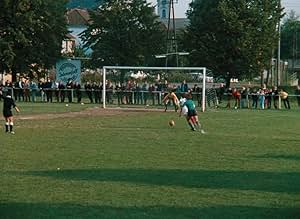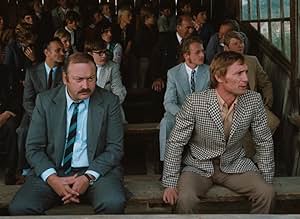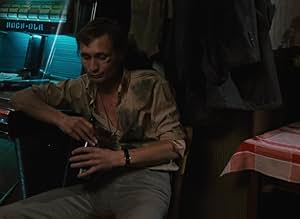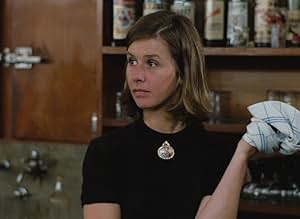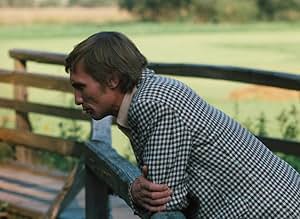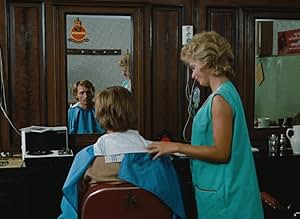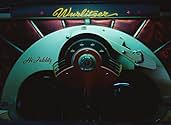L'Angoisse du gardien de but au moment du penalty
Titre original : Die Angst des Tormanns beim Elfmeter
- 1972
- Tous publics
- 1h 41min
NOTE IMDb
6,5/10
2,5 k
MA NOTE
Josef Bloc, gardien de but, est expulsé d'un match pour tricherie. Il quitte le terrain et passe la nuit avec une caissière de cinéma.Josef Bloc, gardien de but, est expulsé d'un match pour tricherie. Il quitte le terrain et passe la nuit avec une caissière de cinéma.Josef Bloc, gardien de but, est expulsé d'un match pour tricherie. Il quitte le terrain et passe la nuit avec une caissière de cinéma.
- Réalisation
- Scénario
- Casting principal
- Récompenses
- 1 victoire au total
Monika Poeschl
- 1. Frisöse
- (as Monika Pöschl)
Avis à la une
Due the greatness that Wim Wenders became thru the years, his fundation made many efforts to try recover the worn out negative of this movie, as newbie director he had erroneously used several tracks of famous singers as Elvis Presley, Credence Clearwater, Roy Orbison and The Doors as well permissionless, whereby he can't afford due the high cost of the copyrights, on ultimate restoration a high advanced tools were used to regain the bright color.
However to solve the matter of expensive soundtrack already built-in previously on movie, then to fix it he inserts under a fresh one upon the original, just at bar sequence he got the consent from own singer Morisson freely previous his death, otherwise the movie could be buried for good all those info above is upon the own Wim Wenders statement contained on bonus material.
In fact he based on the Peter Handke's novel his closest friend in this directorial debut, over an average goalkeeper dismissed from the game by foul play, hereinafter wandering around committing foolish things to extent of throttle a woman, meanwhile such weirdo guy used to stay overnight in countless cheaper hotels at Austria and neighborhood areas, a kind of pointless existentialism offering, although we can oversee a promising filmmaker in this interesting minor flick.
Thanks for reading.
Resume:
First watch: 2024 / How many: 1 / Source: DVD / Rating: 7.
However to solve the matter of expensive soundtrack already built-in previously on movie, then to fix it he inserts under a fresh one upon the original, just at bar sequence he got the consent from own singer Morisson freely previous his death, otherwise the movie could be buried for good all those info above is upon the own Wim Wenders statement contained on bonus material.
In fact he based on the Peter Handke's novel his closest friend in this directorial debut, over an average goalkeeper dismissed from the game by foul play, hereinafter wandering around committing foolish things to extent of throttle a woman, meanwhile such weirdo guy used to stay overnight in countless cheaper hotels at Austria and neighborhood areas, a kind of pointless existentialism offering, although we can oversee a promising filmmaker in this interesting minor flick.
Thanks for reading.
Resume:
First watch: 2024 / How many: 1 / Source: DVD / Rating: 7.
The Goalkeeper's Fear of the Penalty is a great title but an odd underwhelming film from Wim Wenders, his cinematic debut.
I only wish it was about a goalkeeper who went all wobbly when about to face a spot kick.
The film does display some of Wender's cinematic tastes. A liking of Americana, being on the road, a character being a person of few words maybe alienated and a languid pace. There is an existentialism about this film.
Joseph Bloch (Arthur Brauss) is a goalkeeper who gets angry when a goal is not called offside. It is a strangely shot sequence as Bloch does not concentrate on the play and makes no attempt to even save the shot. In fact we do not even see the build up to the play.
Bloch gets sent off and as his team was playing away, he makes his way to the city centre where he watches a film. Later he spends a night with the cinema cashier and he than strangles her. Bloch then leaves the city and spends times with an ex girlfriend in the countryside. Bloch constantly reads the newspaper to see what is happening about the murder, there is also a mute boy who has disappeared. Bloch spends time with his ex, listening to American rock n roll and getting involved in bar fights.
If Bloch is upset about the murder we do not get to know about it. The movie is bookended by a football match, at one point Bloch tells a spectator about the various thoughts that go through in a goalkeeper's mind when a penalty is about to be taken.
The lead character is an enigma, he goes about his normal life but he is a killer, maybe he has killed before, maybe he is a fantasist with his interest in American music and carrying US currency. It could just be that Bloch is contemplative about his existence.
In terms of tension, there is not much at all. Bloch gets on with his life, he is never in danger, no one is closing in on him. Critically lauded, age has not been kind to this film. Slow moving and boring.
I only wish it was about a goalkeeper who went all wobbly when about to face a spot kick.
The film does display some of Wender's cinematic tastes. A liking of Americana, being on the road, a character being a person of few words maybe alienated and a languid pace. There is an existentialism about this film.
Joseph Bloch (Arthur Brauss) is a goalkeeper who gets angry when a goal is not called offside. It is a strangely shot sequence as Bloch does not concentrate on the play and makes no attempt to even save the shot. In fact we do not even see the build up to the play.
Bloch gets sent off and as his team was playing away, he makes his way to the city centre where he watches a film. Later he spends a night with the cinema cashier and he than strangles her. Bloch then leaves the city and spends times with an ex girlfriend in the countryside. Bloch constantly reads the newspaper to see what is happening about the murder, there is also a mute boy who has disappeared. Bloch spends time with his ex, listening to American rock n roll and getting involved in bar fights.
If Bloch is upset about the murder we do not get to know about it. The movie is bookended by a football match, at one point Bloch tells a spectator about the various thoughts that go through in a goalkeeper's mind when a penalty is about to be taken.
The lead character is an enigma, he goes about his normal life but he is a killer, maybe he has killed before, maybe he is a fantasist with his interest in American music and carrying US currency. It could just be that Bloch is contemplative about his existence.
In terms of tension, there is not much at all. Bloch gets on with his life, he is never in danger, no one is closing in on him. Critically lauded, age has not been kind to this film. Slow moving and boring.
I just want to say that this movie, when I watched it first time long ago, opened the doors of what cinema could say, in which ways, and how it could go as far as possible from a typical theatrical or literary (linear,logical, rational) treatment of its artistic matter; pursuing a more "musical" or "harmonically oriented" approach.
Wenders develops this work as a series of "climates" or ambiances(we're talking "street" climates and ambiances, sometimes ugly or ridiculous; not that silly "grandeur" that spoils so many artworks) that contain valuable, almost satirical remarks on the "cheating" that our expectations and concepts are constantly playing to our minds.
The particular sense of humor and drama of the script writer and the director just hit a string on me; as did the musical score. I only regret that is very difficult to find plays or to purchase any copies, in any format, of this strange gem here in Argentina. I could watch it only twice, in cultural centers at Buenos Aires, which is not my hometown. This is a movie that you can enjoy over and over, as if it were a musical masterpiece. I'd like to point out that I'm not a native English speaker, so I apologize if my writing style is not quite correct.
Wenders develops this work as a series of "climates" or ambiances(we're talking "street" climates and ambiances, sometimes ugly or ridiculous; not that silly "grandeur" that spoils so many artworks) that contain valuable, almost satirical remarks on the "cheating" that our expectations and concepts are constantly playing to our minds.
The particular sense of humor and drama of the script writer and the director just hit a string on me; as did the musical score. I only regret that is very difficult to find plays or to purchase any copies, in any format, of this strange gem here in Argentina. I could watch it only twice, in cultural centers at Buenos Aires, which is not my hometown. This is a movie that you can enjoy over and over, as if it were a musical masterpiece. I'd like to point out that I'm not a native English speaker, so I apologize if my writing style is not quite correct.
Huh that Wenders guy really knows how to make a good movie. Who would've thought...
It is difficult to comment on such a brilliant movie without having read the book first, or even better, being familiar with Peter Handke's narrative works. While it may seem evident (to us, accustomed to Hollywood's conventional plots) that the main character of The Goalie... is a madman, it is not evident at all. Handke's approach to narrative is to reflect exterior signs, rather than enter the character's inner thoughts. See The Lefthanded Woman for example: while it may seem, on the surface, that the woman does not have a reason for divorce, in fact she might have a lot, only she does not reveal what is on her mind. Same applies to the goalie: he would not speak his mind, therefore we, and even Handke himself (or Wenders) can not enter his own intimate realm. Whatever his reasons are for what he does (and murder is only one of his unexplained acts) we can not know them. The film is about communication between people more than murder. It is funny that most of us would assume he is mad just because we can not find an account of his acts: if you think about it, in the real world outside the movie realm, most people -and even our closest friends- would not tell us why they do what they do. And it does not necessarily mean they are mad.
Le saviez-vous
- AnecdotesThe film remained unavailable for three decades for reasons of music rights. (The original soundtrack includes works of Elvis Presley and the Rolling Stones, which is more expensive than the production of the film itself. ) To make the film possible to view again, the director Wim Wenders obtains the right of several songs and replaces other pieces with new songs of lyrics. Those were produced using period instruments and analog techniques from the 1950s to imitate the sound of that time as faithful as possible.
- GaffesThe newspaper article "Heiße Spur im Mordfall Gloria T." (Firm lead in Gloria T. murder case) is actually a newspaper article about a car crash and has nothing whatsoever to do with the movie's plot. It seems that only the headline was changed for the purpose of filming.
- ConnexionsFeatured in Motion and Emotion: The Films of Wim Wenders (1990)
Meilleurs choix
Connectez-vous pour évaluer et suivre la liste de favoris afin de recevoir des recommandations personnalisées
- How long is The Goalie's Anxiety at the Penalty Kick?Alimenté par Alexa
Détails
- Date de sortie
- Pays d’origine
- Langues
- Aussi connu sous le nom de
- The Goalie's Anxiety at the Penalty Kick
- Lieux de tournage
- Sociétés de production
- Voir plus de crédits d'entreprise sur IMDbPro
Box-office
- Budget
- 620 000 DEM (estimé)
Contribuer à cette page
Suggérer une modification ou ajouter du contenu manquant

